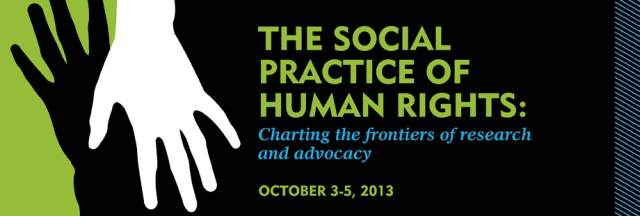Location
River Campus, Room M2060
Start Date
10-4-2013 1:00 PM
Abstract
For over fifty years, Catholic nongovernmental organizations have been actively engaged in the promotion and protection of human rights around the world. From grassroots training programs to targeted advocacy work in Geneva, these organizations are helping to shape both scholarly discourse and political policy.
Given the growing role played by civil society actors, this paper will critically consider the ethical and theological significance of human rights NGOs, in particular Catholic organizations, in three parts. It will begin with a brief sketch of the present reality and historical relationship of Catholic NGOs to the human rights movements. Following Vatican II and John XXIII’s Pacem in Terris, many Catholic organizations pushed aside earlier hostility to rights language in favor of a rights-based approach to their educational programs and activism. Today, these organizations are active voices in the UN Human Rights Council and related treaty bodies.
After taking stock of the experience and reality of Catholic NGOs, the second part of the paper will consider the role of NGOs theologically by addressing two questions. First, do these organizations participate in the mission of the church in their efforts to promote human rights? Second, can these organizations be seen as “structures of grace?”
Finally, this paper will outline several ethical implications that surface from the theological analysis. These implications address concerns that are relevant to many NGOs, including participation, transparency, and accountability.
Voices in the Wilderness: Catholic NGOs and the Challenge of Human Rights
River Campus, Room M2060
For over fifty years, Catholic nongovernmental organizations have been actively engaged in the promotion and protection of human rights around the world. From grassroots training programs to targeted advocacy work in Geneva, these organizations are helping to shape both scholarly discourse and political policy.
Given the growing role played by civil society actors, this paper will critically consider the ethical and theological significance of human rights NGOs, in particular Catholic organizations, in three parts. It will begin with a brief sketch of the present reality and historical relationship of Catholic NGOs to the human rights movements. Following Vatican II and John XXIII’s Pacem in Terris, many Catholic organizations pushed aside earlier hostility to rights language in favor of a rights-based approach to their educational programs and activism. Today, these organizations are active voices in the UN Human Rights Council and related treaty bodies.
After taking stock of the experience and reality of Catholic NGOs, the second part of the paper will consider the role of NGOs theologically by addressing two questions. First, do these organizations participate in the mission of the church in their efforts to promote human rights? Second, can these organizations be seen as “structures of grace?”
Finally, this paper will outline several ethical implications that surface from the theological analysis. These implications address concerns that are relevant to many NGOs, including participation, transparency, and accountability.




Comments
This biennial conference provides a unique space for scholars, practitioners and advocates to engage in collaboration, dialogue and critical analysis of human rights advocacy — locally and globally. Learn more about the Human Rights Center at the University of Dayton >>>.